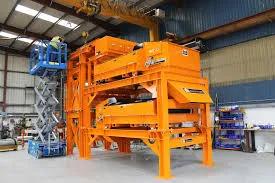

10月 . 21, 2024 23:16 Back to list
DIY Copper Wire Granulator A Step-by-Step Guide
If you're looking to recycle scrap copper wire and turn it into valuable copper granules, building your own copper wire granulator can be a rewarding project. Not only does this DIY approach help you save money, but it also promotes environmental sustainability. In this article, we will walk you through the process of creating a simple yet effective DIY copper wire granulator.
Understanding Copper Wire Granulators
Copper wire granulators are machines that separate copper wire from insulation materials, allowing recyclers to collect pure copper granules. These granules can then be sold to scrap yards or used for various projects, making this process both economically and environmentally beneficial.
Tools and Materials Needed
Before diving into the construction of your copper wire granulator, gather the following materials and tools
- Electrical components (such as a motor, wires, switches) - Metal frame (to hold all components together) - Blades (for cutting the wires) - Screens (to separate copper granules from insulation) - Copper wire (for recycling) - Screws, nuts, and bolts (for assembly) - Safety equipment (gloves, goggles)
Construction Steps
1. Design the Frame
Begin by designing a sturdy frame to support the motor and other components. It’s best to use scrap metal or wood for this purpose. Make sure the frame is stable enough to handle the vibrations from the motor during operation.
2. Attach the Motor

Mount the motor securely onto the frame. This motor will drive the blades that will chop the copper wire into small pieces. Ensure that the motor is properly aligned with the blades for efficient cutting.
3. Install the Blades
Select or craft sharp blades that can effectively cut through copper wire and insulation. Attach them to a rotating shaft connected to the motor. The blades must be positioned carefully to maximize their effectiveness while ensuring safety during operation.
4. Create a Separation Mechanism
To separate the copper granules from the insulation, install screens beneath the blades. The screens should be designed to allow the smaller copper particles to fall through while catching the larger pieces of insulating material. You may need to experiment with different mesh sizes to find the optimal configuration.
5. Wiring and Safety Features
Properly wire the motor and install switches for easy operation. Ensure that all electrical connections are safe and insulated to prevent any risks of shorts or sparks. Additionally, consider adding safety features such as emergency stops to safeguard against unexpected incidents.
6. Test and Adjust
Once assembled, perform a series of tests with scrap copper wire. Adjust the blade's speed and positioning as necessary to ensure a clean separation between copper and insulation. You may need to make several adjustments to achieve the desired results.
Conclusion
Building a DIY copper wire granulator can be a fulfilling project, offering you a practical solution for recycling scrap copper wire. This process not only supports your financial goals but also contributes to a greener planet by reducing waste. Always prioritize safety during the construction and operational phases, and don’t hesitate to seek guidance from experienced DIYers if needed. Happy recycling!
Latest news
Troubleshooting Common Eddy Separator Problems
NewsJul.04,2025
The Role of Metal Recycling Plants in Circular Economy
NewsJul.04,2025
The Impact of Recycling Line Pickers on Waste Management Costs
NewsJul.04,2025
Safety Features Every Metal Shredder Should Have
NewsJul.04,2025
How Industrial Shredders Improve Waste Management Systems
NewsJul.04,2025
How Cable Granulators Contribute to Sustainable Recycling
NewsJul.04,2025